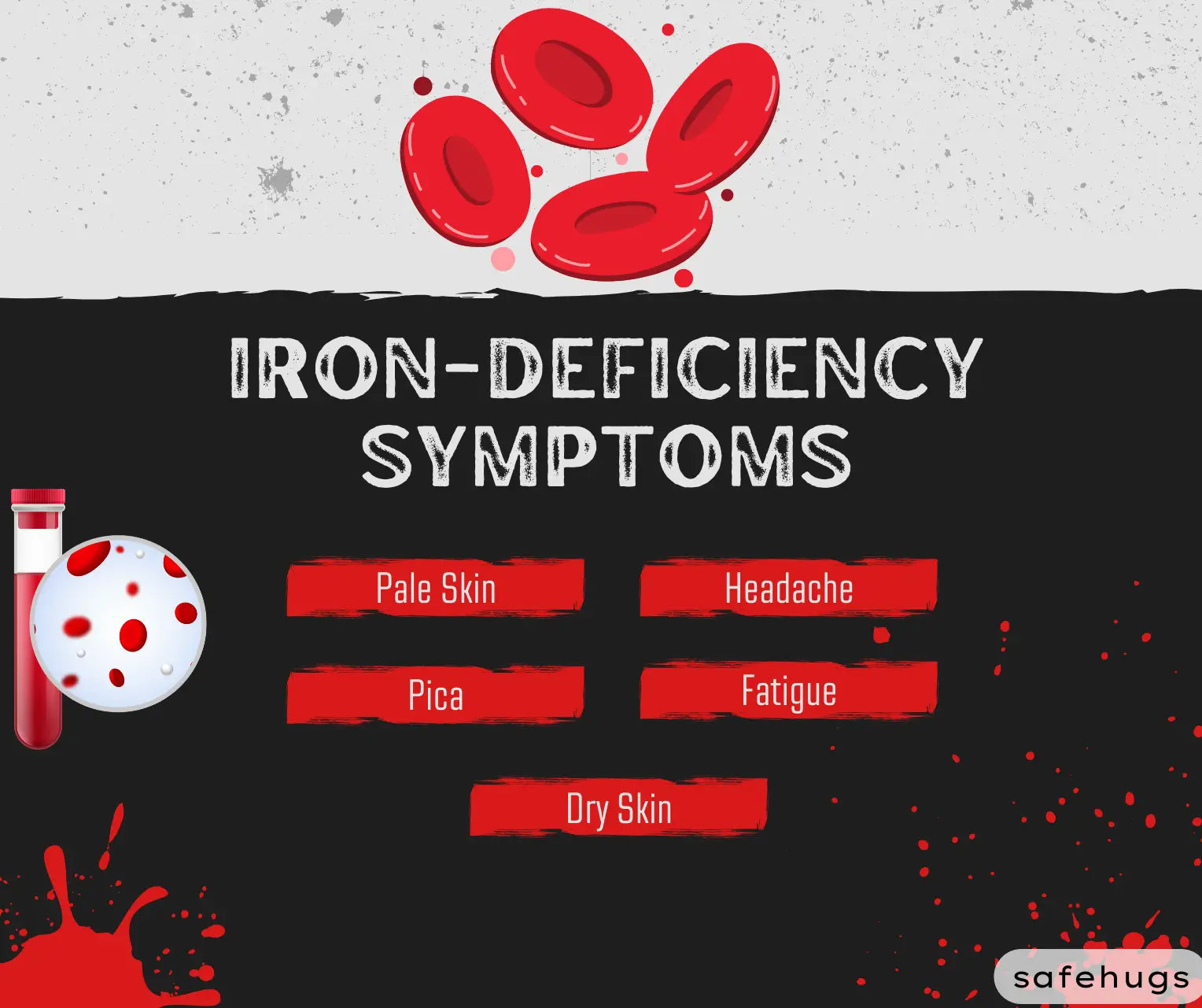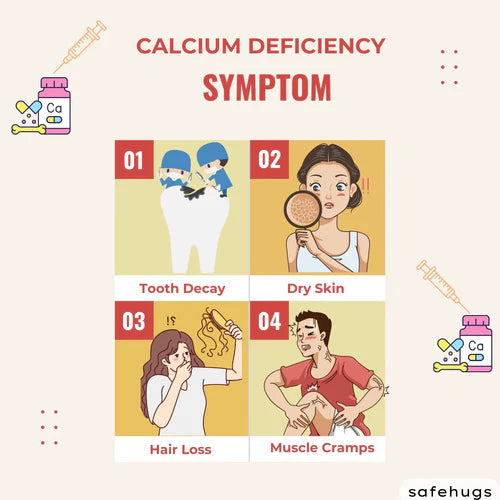Magnesium Deficiency in Kids: 11 Warning Signs & Symptoms

Magnesium deficiency in kids can cause fatigue, muscle weakness, cramps, and irritability. It may also lead to sleep difficulties and poor concentration. Magnesium is vital for bone health, nerve function, and energy production. Deficiency often results from poor diet, excessive sweating, or medical conditions. Here’s an overview of magnesium deficiency, its symptoms, causes, and potential impacts on children. A diet rich in nuts, seeds, and leafy greens can help prevent magnesium deficiency.
11 Warning sign of Magnesium Deficiency
- Fatigue: Experiencing persistent tiredness and low energy levels, even after adequate sleep or rest.
- Muscle Cramps: Frequent cramping, twitching, or spasms in muscles, particularly in the legs or arms, often without a clear cause.
- Irritability: Increased mood swings, frustration, or feelings of restlessness that are difficult to manage.
- Sleep Issues: Difficulty falling asleep, staying asleep, or experiencing poor sleep quality, leading to daytime tiredness.
- Poor Concentration: Struggling to focus on tasks, stay attentive, or process information effectively, impacting daily activities.
- Weakness: Feeling unusually weak or experiencing reduced strength in muscles, making physical activities more challenging.
- Loss of Appetite: A noticeable decrease in appetite, leading to reduced food intake or unintentional weight loss over time.
- Nausea: Frequent episodes of nausea or queasiness, sometimes accompanied by an upset stomach or discomfort.
- Bone Health Issues: Weak or brittle bones, delayed growth in children, or a higher susceptibility to fractures and injuries.
- Irregular Heartbeat: Occasional or persistent episodes of heart palpitations or an unusual rhythm, potentially signaling low magnesium.
- Headaches or Migraines: Experiencing regular headaches or migraines that may worsen due to magnesium deficiency.
Magnesium Deficiency in Kids Symptoms

- Muscle Weakness and Cramps: Children may experience frequent muscle cramps, spasms, or weakness, particularly during physical activity or at night.
- Headache: Low magnesium levels can trigger frequent headaches or migraines due to its role in nerve function and muscle relaxation.
- Fatigue and Tiredness: A general feeling of fatigue or tiredness can occur, impacting a child's energy levels and willingness to engage in activities.
- Poor Sleep: Insomnia or difficulty sleeping may be common, leading to restlessness and complaints about cramps during the night.
- Mood Changes: Symptoms such as irritability, mood swings, anxiety, and hyperactivity can manifest as magnesium plays a critical role in regulating neurotransmitters that affect mood.
- Difficulty Concentrating: Children may struggle with focus and attention span, which can affect their performance in school and daily activities.
- Nausea and Loss of Appetite: Early signs may include gastrointestinal upset, leading to nausea and a decreased interest in food.
- Constipation: Magnesium helps regulate bowel movements; low levels can lead to constipation.
- Numbness or Tingling: Neurological symptoms such as numbness or tingling in the extremities may develop due to nerve dysfunction related to low magnesium levels.
- Teeth Grinding (Bruxism): Some children may grind their teeth at night, which can be associated with magnesium deficiency.
- Sensitivity to Noise: Increased sensitivity to sound may occur, making children more easily startled or agitated by loud noises.
- Growing Pains: Complaints of growing pains or discomfort in the legs can be linked to low magnesium levels.
Factors Contributing to Magnesium Deficiency
- Dietary Insufficiency: A diet high in processed foods often lacks adequate magnesium.
- Digestive Disorders: Conditions like celiac disease or chronic diarrhea can impair absorption.
- Increased Physical Activity: Active children may require more magnesium than sedentary ones.
- Stress: Stressful situations can deplete magnesium levels as the body uses more magnesium during stress responses.
Key Facts :
Magnesium is essential for the body because it supports over 300 different processes, including energy production, muscle and nerve function, and maintaining healthy bones.
New Born Magnesium Levels
- Normal Range: Magnesium levels in newborns typically range from 1.5 to 2.2 mg/dL (0.62 to 0.91 mmol/L).
- Importance: Magnesium is crucial for bone development, muscle function, and nervous system health in newborns.
- Causes of Low Magnesium: Deficiency may result from maternal magnesium deficiency, premature birth, or underlying medical conditions.
- Symptoms of Low Levels: Signs include irritability, muscle twitching, poor feeding, and delayed growth.
- Monitoring and Treatment: Regular monitoring of magnesium levels ensures healthy development and allows timely intervention if necessary.
How to test Magnesium Deficiency at Home
Testing magnesium deficiency at home is challenging because it typically requires blood tests for accurate diagnosis. However, you can look for common symptoms that might suggest a deficiency, such as:
- Fatigue: Persistent tiredness or low energy levels.
- Muscle Cramps: Frequent muscle spasms or cramps, especially at night.
- Irritability or Mood Swings: Increased feelings of irritability or anxiety.
- Sleep Issues: Difficulty sleeping or restless sleep.
- Poor Concentration: Difficulty focusing or staying attentive.
If you notice these signs, it's best to consult a healthcare provider, who can recommend blood tests or other diagnostic measures to check magnesium levels accurately.
Hypermagnesemia symptoms

Symptoms of Low Magnesium
- Fatigue and Weakness: Persistent tiredness, low energy, and muscle weakness.
- Muscle Cramps and Spasms: Frequent cramps, spasms, or twitching, especially at night.
- Mood Changes and Sleep Issues: Irritability, anxiety, difficulty sleeping, or poor-quality rest.
- Heart and Nerve Issues: Abnormal heart rhythms, headaches, tingling, or numbness.
If you experience these symptoms, it's advisable to consult a healthcare provider for proper diagnosis and treatment.
Causes of Magnesium Deficiency
- Poor Diet: A diet lacking in magnesium-rich foods like leafy greens, nuts, seeds, and whole grains.
- Malabsorption: Conditions like celiac disease, Crohn’s disease, or other digestive issues that impair nutrient absorption.
- Increased Need: Rapid growth periods or high physical activity levels that deplete magnesium stores.
- Excessive Sweating: High temperatures, excessive exercise, or fever causing magnesium loss through sweat.
- Chronic Illness: Certain medical conditions, like diabetes or kidney disease, can increase magnesium loss or reduce its absorption.
- Medications: Certain drugs, such as diuretics, may interfere with magnesium levels in the body.
If you suspect magnesium deficiency in your child, a healthcare provider can conduct tests and provide guidance on prevention and treatment.
Magnesium Deficiency Skin Symptom
- Dry, Itchy Skin: Magnesium deficiency can lead to dry, flaky, and irritated skin, making it prone to itching.
- Rashes or Eczema: Skin rashes or flare-ups of conditions like eczema can be aggravated by low magnesium levels.
- Redness and Inflammation: Magnesium deficiency may cause skin to appear inflamed, red, or swollen.
- Sensitive Skin: Kids with magnesium deficiency might have more sensitive skin that reacts poorly to various skincare products or environmental factors.
- Acne: Hormonal imbalances triggered by low magnesium levels may contribute to acne or pimples, especially in older children or teenagers.
If these skin symptoms are present, consulting a healthcare provider for a proper diagnosis and magnesium supplementation may be beneficial.
Impact of Magnesium on Behaviour Image
- Mood Swings: Low magnesium levels can lead to increased irritability, restlessness, and frequent mood changes.
- Hyperactivity: Magnesium deficiency may contribute to hyperactive behaviors or difficulty sitting still.
- Anxiety and Stress: Insufficient magnesium can heighten feelings of anxiety or nervousness in children.
- Poor Focus: Kids with low magnesium may struggle with concentration, leading to challenges in learning or completing tasks.
- Sleep Disturbances: Magnesium plays a role in calming the nervous system, and deficiency may cause trouble falling or staying asleep, affecting behavior during the day.
Ensuring adequate magnesium intake can help regulate behavior, improve focus, and promote emotional stability in children.
Magnesium and Sleep
- Promotes Relaxation: Magnesium helps regulate the nervous system, promoting a sense of calm that aids in falling asleep.
- Improves Sleep Quality: Adequate magnesium levels support deep, restful sleep by regulating neurotransmitters like GABA.
- Eases Sleep Disturbances: Deficiency in magnesium can lead to trouble staying asleep, restless sleep, or waking up frequently.
- Reduces Restlessness: Magnesium can help alleviate nighttime muscle cramps or twitches that disrupt sleep.
- Balances Melatonin: Magnesium supports the production of melatonin, the hormone responsible for regulating sleep cycles.
| Age Group | Recommended Intake (mg/Day) |
| 0 to 3 Months | 55 |
| 4 to 6 Months | 60 |
| 7 to 9 Months | 75 |
| 10 to 12 Months | 80 |
| 1 to 3 Years | 85 |
| 4 to 6 Years | 120 |
| 7 to 10 Years | 200 |
Should kids take magnesium supplements?
Whether kids should take magnesium supplements depends on their individual needs and dietary intake. Here are some key points:
- Dietary Intake First: Most kids can meet their magnesium needs through a balanced diet rich in foods like nuts, seeds, leafy greens, whole grains, and dairy.
- When Supplements May Be Needed: Supplements might be recommended for kids with certain medical conditions, poor dietary habits, or symptoms of magnesium deficiency, such as muscle cramps, fatigue, or irritability.
- Consult a Healthcare Provider: Always consult a pediatrician before giving magnesium supplements, as excessive intake can cause side effects like diarrhea or abdominal cramps.
- Age-Appropriate Dosage: If supplements are necessary, ensure they are tailored to your child’s age and follow the dosage recommendations.
Magnesium Benefits
- Supports Healthy Growth: Magnesium is essential for strong bones and teeth, aiding in proper development during growing years.
- Enhances Brain Function: Helps improve focus, memory, and cognitive skills critical for learning and school performance.
- Improves Mood and Behavior: Magnesium calms the nervous system, reducing irritability, restlessness, and anxiety.
- Boosts Energy Levels: Plays a key role in energy production, keeping kids active and reducing fatigue.
- Aids Sleep: Promotes relaxation and better sleep quality by regulating melatonin and calming muscles.
- Prevents Muscle Cramps: Reduces the risk of cramps, spasms, and twitching by supporting healthy muscle function.
- Strengthens Immunity: Contributes to a robust immune system, protecting kids from common infections.
Magnesium Foods
- Nuts and Nut Butters: Almonds, cashews, and peanut butter are tasty, kid-friendly sources of magnesium.
- Leafy Greens: Spinach and kale can be blended into smoothies or added to dishes like pasta and omelets.
- Whole Grains: Brown rice, whole-grain bread, and oatmeal provide magnesium and energy for growing bodies.
- Dairy Products: Milk, yogurt, and cheese are delicious options for magnesium and calcium.
- Bananas: A favorite snack that’s convenient and packed with magnesium and potassium.
- Avocados: Creamy and versatile, avocados can be added to sandwiches, salads, or mashed as a dip.
- Dark Chocolate: A fun treat that’s also high in magnesium (choose low-sugar options for health).
- Beans and Lentils: Black beans, chickpeas, and lentils can be added to soups, stews, or as side dishes.
- Seeds: Pumpkin seeds and sunflower seeds make crunchy, magnesium-rich snacks.
- Sweet Potatoes: A kid-friendly vegetable that’s nutritious and magnesium-packed.
Supplements for 3 Year Old
Magnesium supplements for a 3-year-old should only be given under the guidance of a pediatrician. It's important to ensure your child needs the supplement and that the dosage is safe. Here are key considerations:
- Liquid or Powder Form: For toddlers, magnesium supplements are often available in liquid or powder form for easier administration.
- Dosage: The recommended dietary allowance (RDA) daily magnesium intake for a 3-year-old is about 80 mg. Never exceed this without medical advice.
- Magnesium Glycinate or Citrate: These forms are gentle on the stomach and more easily absorbed by the body.
- Foods First: Focus on incorporating magnesium-rich foods like nuts, seeds, leafy greens, and dairy into your child’s diet before turning to supplements.
- Watch for Side Effects: Too much magnesium can cause diarrhea or stomach upset, so monitor for any adverse reactions.
Epsom Salt Bath for Kids and Babies
Epsom salt baths can be a soothing and beneficial addition to your child’s routine when used appropriately. Here's what you need to know:
- Benefits: Epsom salt contains magnesium sulfate, which may help relax muscles, ease tension, improve sleep, and soothe minor skin irritations.
- Preparation: Add 1-2 tablespoons of Epsom salt to a baby’s bath or 1/2 to 1 cup for older children. Dissolve it completely in warm water before allowing your child to bathe.
- Frequency: Limit Epsom salt baths to 1-2 times a week to avoid overexposure to magnesium.
- Safety: Ensure your child doesn’t drink the bathwater, as consuming Epsom salt can lead to stomach upset. Always supervise young children in the bath.
- Consult a Doctor: Before introducing Epsom salt baths, especially for babies under 6 months or kids with medical conditions, check with your pediatrician.
Epsom salt baths can be a relaxing and natural way to promote wellness, but they should always be used with care.
Magnesium Deficiency Treatment dosage
Treating magnesium deficiency in children requires careful attention to age-appropriate dosages. Below are general guidelines, but always consult a pediatrician before supplementation:
- Infants (0-6 months): 30 mg/day from dietary sources or as recommended by a healthcare provider.
- Infants (7-12 months): 75 mg/day from foods or supplements as advised.
- Toddlers (1-3 years): 80 mg/day from a combination of diet and supplements if necessary.
- Children (4-8 years): 130 mg/day, emphasizing magnesium-rich foods, with supplements only under medical advice.
- Older Children (9-13 years): 240 mg/day, ensuring balanced dietary intake and supplements if prescribed.
Key Points for Treatment
- Focus on Food: Include magnesium-rich foods like nuts, seeds, whole grains, leafy greens, and dairy products.
- Choose the Right Supplement: Magnesium citrate or glycinate are easily absorbed and gentle on the stomach.
- Monitor Side Effects: Watch for diarrhea or stomach upset, signs of excess magnesium intake.
- Medical Supervision: Always involve a healthcare provider to determine the need for supplementation and adjust dosages as required.
Magnesium ADHD dosage
Magnesium supplementation can be beneficial for children with ADHD, as it may help improve focus, reduce hyperactivity, and support overall brain health. However, dosage should always be personalized, ideally under the supervision of a healthcare provider. Below are general guidelines:
- Children (4-8 years): 130 mg/day from both food and supplements.
- Children (9-13 years): 240 mg/day, which includes magnesium-rich foods and supplementation if needed.
- Children (14 years and older): 360 mg/day, again incorporating both dietary sources and supplements as needed.
Key Considerations:
- Forms of Magnesium: Magnesium citrate or magnesium glycinate are commonly recommended for children due to better absorption and gentleness on the stomach.
- Start with Food: Include magnesium-rich foods like leafy greens, nuts, seeds, and whole grains to support overall intake.
- Side Effects: Excess magnesium may cause diarrhea or stomach upset. Always start with lower doses and increase gradually.
- Consult a Pediatrician: Always consult a healthcare provider before beginning magnesium supplements, especially if your child is taking other medications for ADHD.
Magnesium supplementation can be a helpful adjunct to ADHD treatment, but it should be used in conjunction with other therapies as advised by your child's healthcare team.
Will a Magnesium Supplement help my Child Sleep better?
Magnesium supplements may help improve sleep in some children, especially if they have a magnesium deficiency. Magnesium plays a role in regulating neurotransmitters that promote relaxation, including GABA (gamma-aminobutyric acid) , which helps prepare the body for sleep. Here’s how it may help:
- Promotes Relaxation: Magnesium helps calm the nervous system, potentially making it easier for your child to unwind and fall asleep.
- Improves Sleep Quality: Some studies suggest magnesium may improve sleep quality and reduce nighttime awakenings in children.
- Reduces Leg Cramps: If your child experiences leg cramps or discomfort at night, magnesium may help reduce these issues and contribute to better sleep.
- Supports Healthy Sleep Patterns: Magnesium might help regulate the production of melatonin, the hormone responsible for sleep-wake cycles.
However, while magnesium may be beneficial, it’s important to consult with a pediatrician before introducing supplements. A balanced diet with magnesium-rich foods, such as leafy greens, nuts, seeds, and whole grains, should be prioritized first. If sleep issues persist, it could be related to other factors, so it's important to discuss it with a healthcare provider.
Magnesium for babies sleep
Magnesium can play a role in supporting better sleep for babies, but it's important to approach its use with caution and always consult a pediatrician first. Here's how magnesium might help:
- Promotes Relaxation: Magnesium helps to relax muscles and calm the nervous system, which may aid in helping babies settle down for sleep.
- Regulates Sleep Cycles: Magnesium helps support the production of melatonin, the hormone responsible for regulating the sleep-wake cycle.
- Reduces Restlessness: If your baby experiences discomfort like leg cramps or muscle tension, magnesium may help reduce these issues, leading to more restful sleep.
Important Considerations:
- Dietary Sources: Breast milk or formula typically provides adequate magnesium for babies, so supplementation is usually unnecessary unless advised by a doctor.
- Consult Your Pediatrician: Always consult your child’s healthcare provider before considering magnesium supplements for sleep, as they will guide you on appropriate dosages and whether it’s necessary based on your baby’s individual health.
- Non-Supplemental Methods: For babies under 6 months, consider magnesium-rich foods (once solids are introduced) or using other calming bedtime routines.
In most cases, magnesium supplementation for sleep should be a decision made by a pediatrician to ensure your baby’s safety and well-being.
Magnesium for toddlers sleep
Magnesium may help toddlers with sleep issues, as it has a calming effect on the nervous system and can promote relaxation. However, before giving magnesium supplements to a toddler, always consult with a pediatrician. Here’s how magnesium might support better sleep for toddlers:
- Calms the Nervous System: Magnesium helps regulate neurotransmitters that promote relaxation and calmness, which may improve sleep quality.
- Reduces Restlessness: It can help reduce physical restlessness, including leg cramps, which may otherwise disturb sleep.
- Regulates Sleep Patterns: Magnesium is involved in the regulation of melatonin, the hormone responsible for the sleep-wake cycle.
- Safe Dietary Sources: Magnesium-rich foods, such as bananas, avocados, and leafy greens, can be introduced into your toddler’s diet to naturally support better sleep.
If your toddler is having trouble sleeping, magnesium supplementation can be considered, but it’s important to start with a healthcare provider’s guidance to ensure it’s necessary and safe.
Magnesium for toddler constipation
Magnesium can be helpful for toddlers dealing with constipation, as it has a natural laxative effect. It works by drawing water into the intestines, which softens stool and makes it easier to pass. However, always consult with a pediatrician before giving magnesium supplements to your toddler. Here’s how magnesium may help with constipation:
- Softens Stool: Magnesium helps relax the muscles in the digestive tract and draws water into the stool, making it softer and easier to pass.
- Gentle Laxative Effect: It has a mild laxative effect that can help relieve constipation without harsh side effects, such as cramping.
- Magnesium-rich Foods: Include magnesium-rich foods like spinach, avocados, and bananas in your toddler’s diet to help prevent constipation naturally.
- Supplementation: If recommended by a doctor, magnesium citrate or magnesium glycinate in the right dosage can be used to relieve constipation in toddlers.
Always monitor your toddler’s response to magnesium and avoid excessive use, as too much can lead to diarrhea or dehydration. Consult your pediatrician for the appropriate dosage and to rule out any underlying health concerns.
Take home points:
- Magnesium is a key nutrient that helps the body get energy from food, supports the nervous system, and keeps muscles healthy.
- Magnesium-rich foods include whole grains (like brown rice and seeded bread), some breakfast cereals, and nuts and seeds.
- Usually, you don’t need a magnesium supplement if you eat a balanced diet with a variety of foods.
- There isn't strong evidence, especially in children, that magnesium supplements are needed or helpful.
Discover Safehugs clothes that care for your little one’s comfort—soft, stylish, and gentle on the skin, offering a safe embrace.
Related:
FAQ'S
1. How long to correct magnesium deficiency ?
Correcting magnesium deficiency typically takes 1 to 6 weeks, depending on the severity. The time may vary based on supplementation method and individual absorption rates.
2. How to tell if a child has magnesium deficiency?
Signs of magnesium deficiency in children can include muscle cramps, irritability, and fatigue. Other symptoms may include poor appetite, nausea, or abnormal heart rhythms.
3. How do you get magnesium in a child?
Magnesium can be added to a child's diet through magnesium-rich foods like leafy greens, nuts, seeds, and whole grains. Supplements can also be used if recommended by a healthcare provider.
4. Magnesium deficiency treatment ?
Magnesium deficiency is typically treated with oral magnesium supplements or dietary changes to include magnesium-rich foods. In severe cases, intravenous magnesium may be necessary under medical supervision.
5. What fruit is full of magnesium?
Bananas and avocados are fruits high in magnesium. They can be a great addition to the diet to help boost magnesium levels.
































